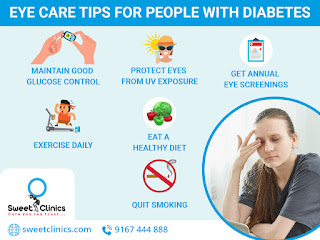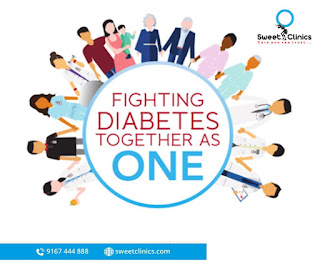Want To Lower Your Blood Sugar..?
In medical terms known as hyperglycemia,
blood sugar is defined as the human’s inability to maintain a normal blood
glucose level. It happens either when pancreas is not making enough insulin, or
because the body’s cells have become insulin resistant that the pancreas cannot
keep up, and glucose keep on accumulating in the bloodstream rather than being transferred
into the cells.
Your blood glucose level is considered on
alert if it is higher than 130 mg/dl before a meal or higher than 180 mg/dl two
hours after a meal.
However according to Diabetes
Specialist Clinic in Navi Mumbai, the signs and symptoms of elevated blood
glucose level don’t appear until the blood glucose level exceeds than 250
mg/dl. Diabetes Care Centre Navi Mumbai, has reported that some patient has rapid
onset of diabetic symptoms, while others require a long period of high blood
glucose to set in. Hyperglycemia
(diabetes) can be acute or chronic. Acute hyperglycemia lasts briefly due to
the result of a high-carbohydrate meal, a missed dose of medicine, stress, or
illness. On the other hand, chronic hyperglycemia, is a long-term elevated
blood glucose levels and is often the result of undiagnosed diabetes or an
inadequate diabetes treatment regimen. As long-term elevated blood glucose in chronic
hyperglycemia has a toxic effect on the body’s tissues. Some of the symptoms of
high blood glucose are actually the aftermath of cellular damage caused by high
blood glucose.
Symptoms
of Hyperglycemia
There are different symptoms of hyperglycemia
at different stages in life, some of the hyperglycemia symptoms that patient
face in their life are as follows:
·
Feeling hungry
·
Sweating
·
Tingling lips
·
Feeling shaky or
trembling
·
Dizziness
·
Feeling tired
·
A fast or pounding
heartbeat (palpitations)
·
Becoming easily
irritated, tearful, stroppy or moody
·
Turning pale
Some of the easy ways to lower blood
sugar levels naturally can take a little more time as compare to the
therapeutic options available in the market yet it is one of the safest way to
go through. Below mentioned are some of the easy ways to follow:
1.
Exercise
Regularly: Best Diabetes Hospitals in NaviMumbai, stress over maintaining body weight in hyperglycemia and the best way
to maintain healthy weight is by excersing. Exercise increases insulin
sensitivity and helps your muscles to utilize sugars from the blood. This can
lead to reduced blood sugar levels.
Exercises such as weight lifting,
running, brisk walking, biking, dancing, hiking, swimming, etc may help you
lose weight and increase insulin sensitivity.
2.
Keep
Your Carb Intake in Check: Your body break down
the complex carbohydrates in your food into simpler ones mostly glucose and then
insulin moves the sugars into cells. With the intake of too many carbs and complications
with insulin function may hinder in the process of absorption leading to the
rise of blood glucose levels. However a simple change in diet can help to
regulate your blood sugar levels. A low-carb diet can help control blood sugar
levels in the long run or reducing carbohydrate intake can help with blood
sugar control.
3. Increase Fiber Intake: Intake
of abundant of fiber can help with blood sugar control, and soluble dietary
fiber is one of the most-effective solutions while in fight with increasing
blood sugar.
4. Consume fluids in
abundance: Keeping yourself hydrated could be the
easiest way to keep those extra calories in check and can reduce blood sugar
levels and help prevent diabetes. Take home message is that consuming fluids
regularly re-hydrates the blood, lowers blood sugar levels and reduces diabetes
risk.
5. Control Your Meal
Portions: The more control over your serving
sizes and the better you will be able to control your blood sugar levels. Try
to eat slow and maintain low glycemic food intake in these portions to help
your body consume that it truly require.
According to best diabetes treatment center in Navi Mumbai in people who do not have diabetes, low blood sugar may
be caused by:
·
Drinking alcohol
·
Insulinoma, which is a
rare tumor in the pancreas that produces too much insulin
·
Lack of a hormone, such
as cortisol, growth hormone, or thyroid hormone
·
Severe heart, kidney,
or liver failure
·
Infection that affects
the whole body (sepsis)
·
Certain weight-loss
surgeries
·
Some antibiotics or
heart drugs
Visit us at Sweet Clinics, Navi Mumbai
to get the guidance under specialist Dr.Vinod Methil.



Comments
Post a Comment